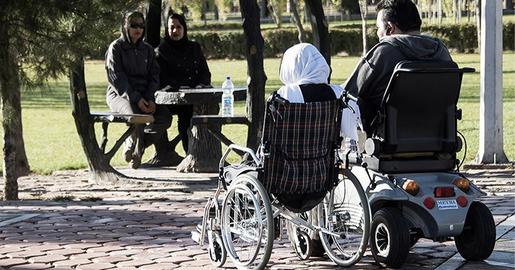The Iranian authorities are not implementing the Law on Protection of Disabled Persons, claiming insufficient funds, even though six years have passed since its enactment.
There are no accurate statistics on people with disabilities in Iran. The Welfare Organization says 1.6 million of them have been referred to this entity, but the real figure is believed to be much higher.
Due to a lack of budget allocation, the Welfare Organization sent 640,000 tomans ($11) in the latest payment to 220,000 severely and very severely disabled people.
According to Article 27 of the Law on Protection of Disabled Persons, the government should pay severely and very severely disabled individuals without jobs or income a subsistence allowance equal to the Ministry of Labor's minimum wage.
The minimum wage this year is 5.308 million tomans ($98) a month.
Why Do the Disabled Take to the Streets?
Over the past year, there have been at least 10 calls for nationwide protests of disabled people, some of which were met with violent crackdowns by the police.
During the past three months, while the budget was being debated in parliament, a series of protests erupted among the disabled community across the country.
The most recent one took place in front of the presidential office on February 4. And in late January, another gathering occurred in front of the Planning and Budget Organization, amid a heavy security presence and threats of arrest. However, the most violent altercation with law enforcement occurred in front of the Management and Planning Organization on January 4.
During all these demonstrations, the protesters consistently called for the enforcement of Article 27 of the Law on the Protection of Disabled Persons.
Each time, promises have been made to address their concerns, yet little progress has materialized.
While insufficient funds have been allocated to enforce Article 27, other provisions crucial for improving disabled people’s lives in urban settings have been neglected.
According to the second chapter of this law, passed in April 2018, municipalities and the Ministry of Roads and Urban Development are tasked with ensuring their needs regarding "adaptation, accessibility, mobility, and traffic.”
However, facilities such as subways, buses, and other urban amenities remain largely inaccessible to wheelchair users, particularly in Tehran.
The Implementation of Article 27 Can Meet the Needs
According to Soheil Moeini, a disabled rights activist and a former member of the committee that drafted the Law on Protection of Disabled Persons, Article 27 stipulates that when the government fails to provide employment for people with disabilities and ensure their livelihood, it is obligated to pay them an amount equivalent to the minimum wage specified in the labor law.
This practice is not uncommon internationally. In France, unemployed individuals with disabilities receive specific allowances to cover expenses such as rent, food, clothing, insurance and healthcare.
Moeini, who is also the editor of Iran's only Braille newspaper, mentions the support mechanisms for people with disabilities in Germany, where additional financial assistance is provided beyond basic living allowances.
For instance, if a disabled individual requires specialized equipment such as a Braille display device, akin to a blind person's laptop, which can cost up to 5,000 euros, the state covers the related expenses.
Similarly, insurance schemes in Germany often cover the costs of electric wheelchairs.
In Iran, such comprehensive support is lacking, with the Welfare Organization's budget falling short of meeting such needs.
Moeini further says that he has attempted to advocate for these demands through dialogue with parliamentary contacts and the media.
However, frustration among some disabled individuals has led them to take to the streets to assert their demands.
"Against the backdrop of escalating economic challenges in Iran, monthly pensions of 900,000 to 1 million tomans fail to address the practical realities of people's lives," she said.
visit the accountability section
In this section of Iran Wire, you can contact the officials and launch your campaign for various problems



























comments